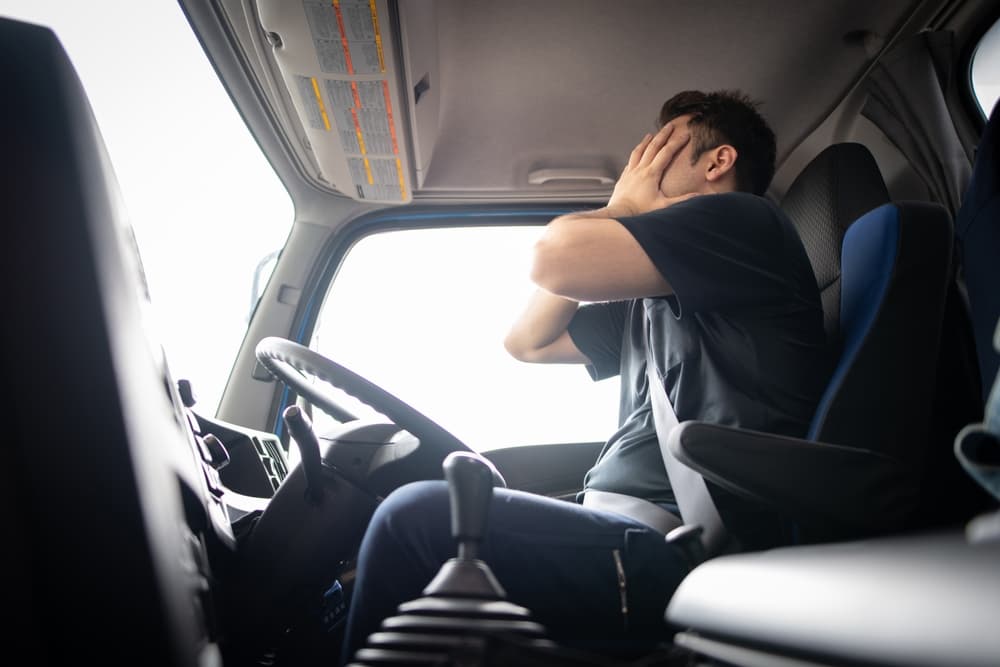Commercial truck accidents come in all shapes and sizes and frequently involve vehicles like tractor-trailers, big rigs, and 18-wheelers. These accidents, which can range from rear-end collisions to head-on crashes with other vehicles, typically happen when truck drivers fail to follow standard road rules or motor carrier safety regulations.
Because commercial trucks are so much larger and heavier than passenger vehicles, these accidents can result in devastating and sometimes deadly injuries.
If you suffered injuries in a recent commercial truck accident that resulted from someone else’s negligence, a knowledgeable truck accident lawyer in your area can swiftly investigate your accident circumstances, file a claim with the appropriate insurance company on your behalf, and pursue the settlement or litigation compensation you need for your accident-related losses.
Common Categories and Causes of Commercial Truck Accidents
Commercial truck accidents, often resulting from truck driver or trucking company negligence, pose significant risks on the road.
Road safety requires that motorists understand the common causes and types of these accidents.

- Truck Driver Fatigue – One of the leading causes of commercial truck accidents is driver fatigue. Long hours on the road, tight schedules, and inadequate rest breaks often contribute to drowsy driving. Fatigued drivers may experience delayed reaction times and decreased attentiveness, increasing the likelihood of accidents.
- Speeding – Speeding is another common issue in commercial truck accidents. Drivers under pressure to meet delivery deadlines may exceed speed limits, compromising their ability to control the truck and respond to unexpected roadway situations that may arise.
- Improper Loading – Improperly loaded cargo can also lead to truck accidents. Overloaded trucks or unbalanced cargo can cause the truck to tip over or lead to difficulty in maneuvering, posing dangers on the road.
- Distracted Driving – Distractions, such as using mobile phones, adjusting GPS devices, or eating, divert the attention of truck drivers from the road. Distracted driving significantly raises the risk of accidents.
- Mechanical Failures – Neglecting regular maintenance or overlooking mechanical issues can result in equipment failures. Brake failures, tire blowouts, or other malfunctions can lead to serious accidents.
- Inadequate Driver Training – Insufficient training of truck drivers is another contributing factor when it comes to accidents. Drivers lacking proper training may struggle to handle the size and weight of commercial trucks, leading to accidents.
- Drug or Alcohol Use – Driving while under the influence of drugs or alcohol (DUI) is a severe form of negligence that significantly affects a truck driver's ability to drive safely.
- Reckless Driving – Reckless behaviors, including aggressive driving and improper lane changes, heighten the risk of commercial truck accidents. Such actions can catch other drivers off guard and result in collisions.
- Pressure from Trucking Companies – Some accidents result from pressure imposed on truck drivers by their companies to meet tight deadlines. Unrealistic schedules may encourage drivers to skip necessary breaks or violate safety regulations, leading to accidents.
When truck drivers and trucking companies commit one or more of these negligent acts, several types of collisions may occur, including:
- Rear-end accidents, where the front of a large truck forcefully strikes the back of another vehicle
- Side-impact collisions, where a large truck strikes the side of a vehicle that is traveling in the same direction
- Rollover accidents, where a large commercial truck fully or partially overturns on the road, causing a multi-vehicle pile-up
- Head-on accidents, where the front of a large truck forcefully strikes the front of an oncoming vehicle, often causing permanent injuries or fatalities
- T-bone accidents, where the front of a truck strikes the side of a vehicle that is traveling on an intersecting road
- Jackknife accident, where a large truck folds in on itself, often causing it to skid forward and strike other vehicles in the vicinity
Frequent Injuries in Truck Collisions
Commercial truck accidents can cause a range of injuries with varying degrees of severity for the individuals involved. These injuries are often more severe due to the size and weight of large commercial trucks.
Some of the most common injuries that truck accident victims may suffer include:
- Whiplash and neck injuries
- Back injuries
- Traumatic head and brain injuries
- Internal organ damage
- Broken bones
- Burn injuries
- Open cuts and lacerations
- Scarring
- Post-traumatic stress disorder (PTSD)
- Amputations
- Fatal injuries
Understanding the potential injuries from commercial truck accidents emphasizes the importance of prioritizing safety measures, enforcing trucking regulations, and raising awareness about the significant consequences of negligence.
If you recently suffered injuries in a truck accident due to someone else’s negligence, an experienced truck accident lawyer can explore your legal options and take the necessary steps on your behalf.
Proving the Elements of a Third-party Truck Accident Claim or Lawsuit
Proving a commercial truck accident claim or lawsuit stemming from truck driver or trucking company negligence involves establishing key legal elements with compelling evidence.
Here's a breakdown of the necessary elements – and the types of evidence required:
- Duty of Care – The first element involves demonstrating that the truck driver or trucking company owed a legal duty of care to others on the road. This duty includes following traffic laws, adhering to safety regulations, and operating the truck responsibly. Evidence necessary to establish the legal duty of care includes traffic laws and regulations, safety protocols and guidelines set by the trucking company, and testimony from expert witnesses on standard trucking industry practices.
- Breach of Duty – The next step is proving that the duty of care was breached, indicating negligence. This may involve showing that the driver violated traffic rules, exceeded driving hours, or neglected required safety checks. Potential evidence may include police reports detailing the circumstances of the accident, electronic logging device (ELD) data showing hours of service violations, maintenance records indicating neglected inspections or repairs, or witness statements confirming reckless driving behavior.
- Causation – Establishing a direct link between the breach of duty and the commercial truck accident is crucial. This involves demonstrating that the negligent actions of the driver or trucking company directly led to the collision. Evidence of causation may include accident reconstruction reports detailing the sequence of events, medical records linking specific injuries to the truck accident, and surveillance footage or dash cam recordings.
- Damages – Finally, it's essential to prove the damages suffered as a result of the accident. This includes physical injuries, property damage, medical expenses, lost income, and emotional distress. Evidence may include medical bills and records, repair estimates or documentation of property damage, and mental health records or expert testimony demonstrating emotional distress.
Collecting and presenting this evidence requires a thorough investigation and legal experience. Consultations with accident reconstruction specialists, medical professionals, and other experts may strengthen the case.
Additionally, maintaining open communication with law enforcement, insurance companies, and legal representatives is essential throughout the process.
In essence, proving the legal elements of a commercial truck accident claim involves meticulously gathering evidence that establishes a breach of duty, causation, and the resulting damages.
This comprehensive approach is essential when it comes to holding responsible parties accountable for their negligence and seeking fair compensation for injuries.
Negotiating with the Insurance Company During a Third-party Truck Accident Claim

In some jurisdictions, following a commercial truck accident, victims may be eligible to file a claim under their own Personal Injury Protection (PIP) policy for various types of compensation.
However, if they suffered a permanent injury in their accident – or meet some other threshold – they can file a claim with the at-fault truck driver or trucking company’s insurer for damages.
When a truck accident lawyer navigates negotiations with insurance company representatives following a commercial truck accident, their primary goal is to secure a favorable settlement compensation for the injured party.
The negotiation process involves several key steps and strategies to achieve a fair outcome.
- Thorough Investigation – A truck accident lawyer initiates negotiations armed with a thorough understanding of the case. They meticulously investigate the accident, gather evidence, and assess the extent of injuries and damages. This knowledge strengthens their position during settlement negotiations.
- Documentation and Presentation – Clear and compelling documentation is also crucial. The lawyer organizes medical records, accident reports, witness statements, and other evidence into a coherent presentation. This documentation serves as a foundation for the settlement negotiation process.
- Establishing Liability for the Accident – Demonstrating the liability of the truck driver or trucking company is key. The lawyer uses evidence to showcase how negligence led to the accident. Establishing liability strengthens the accident victim’s legal position and contributes to a persuasive negotiation strategy.
- Valuing Damages – Accurately valuing the damages incurred is an essential aspect of settlement negotiation. The lawyer considers medical expenses, lost income, property damage, pain and suffering, and other relevant factors. A well-calculated estimate ensures that the injured party seeks fair and comprehensive compensation.
- Open Communication – Effective communication with insurance company representatives is essential. The lawyer maintains clear and open lines of communication, presenting the case’s highlights and responding to inquiries promptly. This open dialogue facilitates a smoother settlement negotiation process.
- Negotiation Skills – An experienced truck accident lawyer employs negotiation techniques to advocate for the victim’s interests. This involves presenting a strong case, countering opposing arguments, and emphasizing the strengths of the injured party’s position.
- Threat of Litigation – Strategically, the lawyer may convey their willingness to take the case to court if the parties cannot reach a favorable settlement. The prospect of litigation can sometimes motivate the insurance company to offer a more favorable settlement to avoid legal proceedings.
A skilled truck accident lawyer effectively:
- Negotiates with insurance company representatives
- Conducts a thorough investigation
- Presents compelling documentation
- Establishes liability
- Accurately evaluates damages
- Maintains open communication
- Employs negotiation skills
- Litigates your claim (if necessary)
- Persistently advocated for their client.
These steps all contribute to a favorable settlement offer that fairly compensates the truck accident victim for their losses.
Recovering Monetary Damages in a Third-Party Truck Accident Claim or Lawsuit
In the aftermath of a commercial truck accident, victims may be eligible to recover various monetary damages through a claim or lawsuit. These damages aim to compensate for the physical, emotional, and financial toll that the truck accident inflicted.
Among the compensable elements are economic damages, which include medical expenses incurred for treating injuries resulting from the accident. These may encompass present and future medical costs, rehabilitation expenses, and necessary ongoing treatments.
Furthermore, accident victims may seek compensation for lost income due to their inability to work during recovery. This aspect extends beyond immediate earnings, considering the effects on future earning capacity resulting from sustained injuries.
Property damage, covering the repair or replacement costs of damaged vehicles or personal belongings, is also recoverable.
In the area of non-economic damages, accident victims may pursue compensation for pain and suffering endured due to injuries sustained in the truck accident. This encompasses physical pain, mental anguish, and the overall distress they experienced as a direct result of the occurrence.
Loss of consortium, recognizing the negative effects on familial relationships and companionship, is another non-economic damage that may be compensable.
The loss of one’s ability to use a specific body part, known as loss of limb or function, represents another category of recoverable damages. This acknowledges the significant consequences of impaired mobility or functionality resulting from the truck accident.
Moreover, accident victims may pursue damages for loss of consortium, recognizing the negative effect on familial relationships and companionship as a result of their truck accident injuries. This acknowledges the broader effects of the accident on the individual’s life well beyond their immediate physical injuries.
Finally, lost quality of life is a compensable element of damage that accounts for the diminished enjoyment of life’s experiences due to the truck accident. This recognizes the significant effects on the victim's daily activities, hobbies, and overall quality of life resulting from the injuries sustained.
Speak With a Truck Accident Lawyer Near You Right Away

If you or someone you love recently suffered injuries in a truck accident that a negligent truck driver or trucking company brought about, consult a skilled personal injury attorney experienced in truck accident cases as soon as possible.
Your attorney can estimate the likely settlement or litigation value of your case based on your medical expenses, the extent of your injuries, and other related factors. Your attorney can take all of the necessary steps to safeguard your legal interests and pursue the financial recovery you deserve.